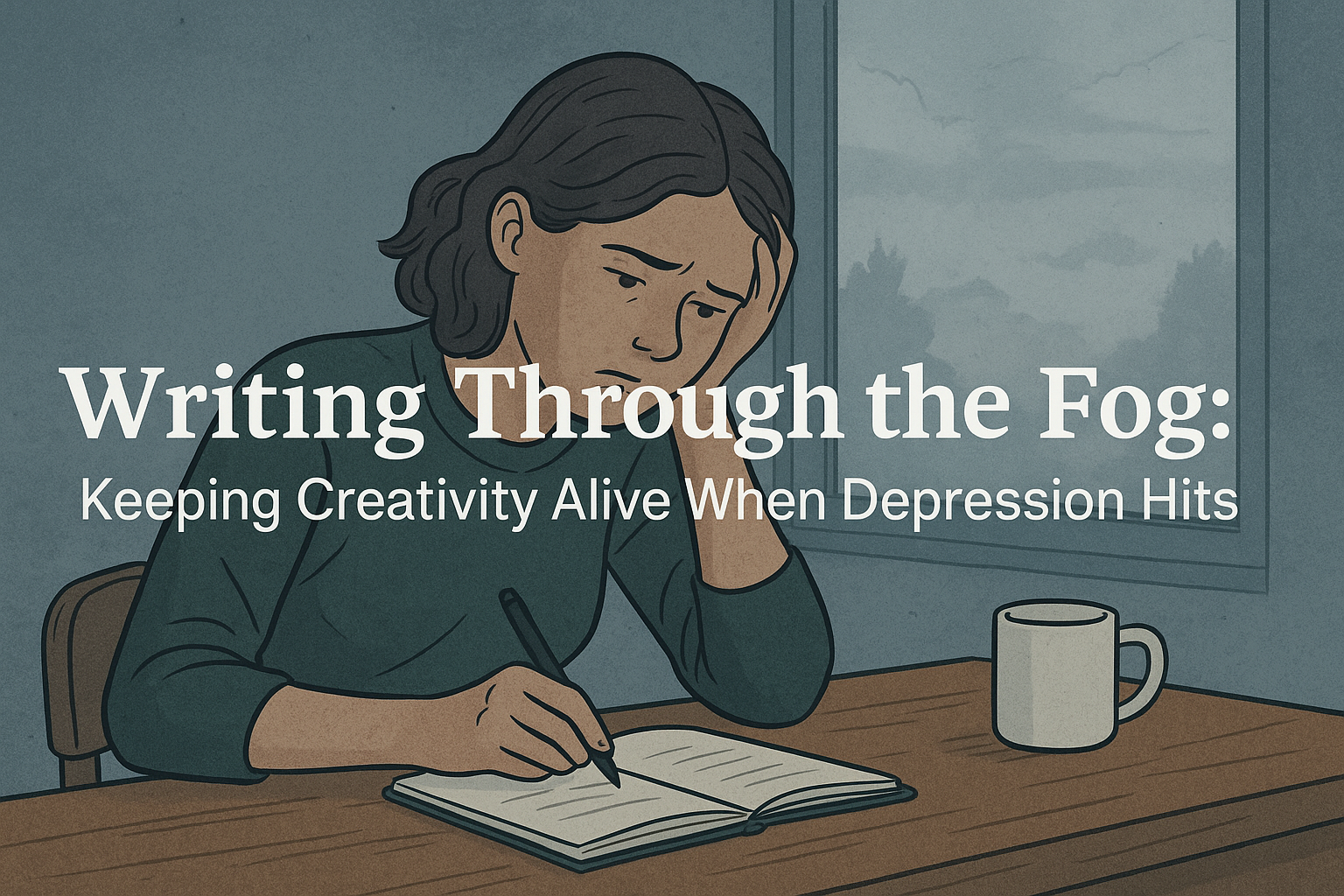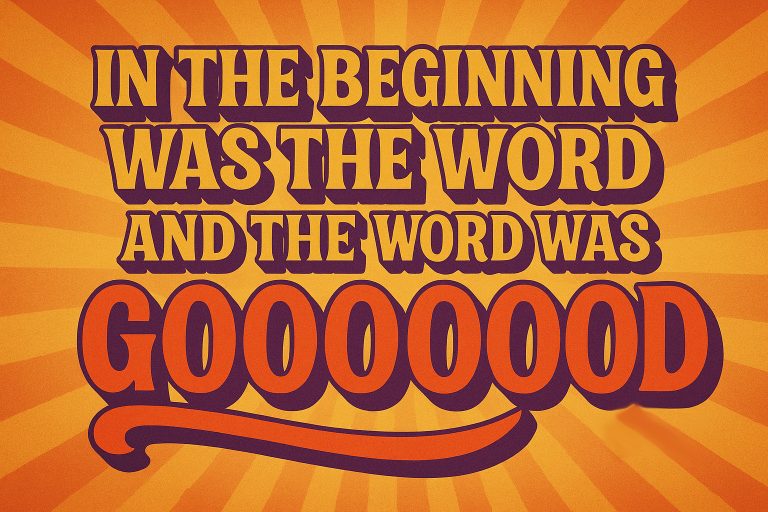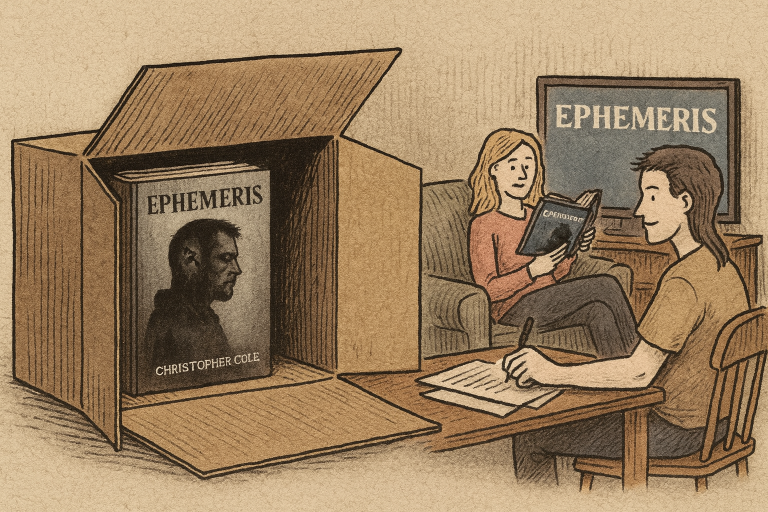Some days, writing feels like breathing. The words tumble out, the ideas connect, and you can almost trick yourself into thinking it’ll always be that way. And then there are days when writing feels like dragging a boulder uphill with a piece of dental floss. If you’ve ever tried to work through a depressive episode, you know the second version all too well.
Why the Blank Page Feels Heavier
Depression doesn’t just make you tired, it messes with how you see yourself and your work. A blank page that normally feels like a chance suddenly feels like proof that you’ve got nothing left. A sentence that would’ve looked fine yesterday feels ridiculous today. That inner critic turns into a heckler with a megaphone.
And yet, that’s why routine matters so much. Writing isn’t about waiting for inspiration to land on your shoulder like a friendly parrot (hi Toro). It’s about showing up, even when you feel like you’ve got nothing. A set routine: same time, same place, same ritual… creates a little structure when your brain feels like chaos. It’s not a cure, but it’s a rope you can grab onto.
Discipline Meets Compassion
Here’s the hard part: you need both discipline and compassion. Push too hard and you’ll burn out. Go too easy and the habit slips away. The sweet spot is in the middle.
That might mean lowering the bar for yourself. Instead of “I’ll write 1,000 words today,” try “I’ll open the document and write for 10 minutes.” Or swap drafting for journaling. (Can’t say I ever practice this one. I have never been much of a journaler.) But I do jot down bullet points. Tiny efforts add up, and they keep you connected to the work so it doesn’t drift out of reach.
Think of it as keeping the pilot light on. You don’t need a roaring fire every day, but you don’t want the flame to go out entirely either.
Writing as Resistance
Here’s something that helps me: remembering that writing, even in scraps, is an act of resistance. Depression tells you that you can’t, that you shouldn’t bother, that it doesn’t matter. Every word you manage to put down is a way of saying, Not today. I’m still here.
And sometimes, those words carry a rawness that’s more honest than anything you’d write on a good day. Depression isn’t some magical “gift” to creativity (let’s not romanticize it), but the work you do during those times is still valuable… even if it doesn’t shine right away.
Permission to Be Human
At the end of the day, your worth as a writer doesn’t depend on how many words you wrote this week. Your identity as a creative person doesn’t vanish just because the fog rolled in. The key is keeping the door open, even if it’s only a crack, so when the light comes back, you’re already in the habit of stepping through it.
Writing through depression isn’t about being prolific. It’s about being present. And sometimes, present just has to be enough.
And if you’re struggling right now… really struggling… you’re not alone. Keep the pen moving, even just a little. Your words matter, and so do you.
And if you’re really hurting, here are some resources that might he helpful:
🚨 National Mental Health Resources
- 988 Suicide & Crisis Lifeline: call or text 988 anytime (24/7). You don’t have to be suicidal to call: it’s for emotional distress, isolation, anxiety, crisis. 988 Lifeline+1
- Crisis Text Line: For those who prefer texting: Text HOME to 741741 to connect with a trained counselor.
- National Depression Hotline: 866-629-4564, free and available 24/7.
🚨 Northern Kentucky Mental Health Resources
- NorthKey Community Care: Serves the 8-county Northern Kentucky region. Offers outpatient therapy, crisis support, telehealth, case management. northkey.org
- Mental Health America of Northern Kentucky & Southwest Ohio (MHANKYSWOH): Peer support, education, safety net services. mhankyswoh.org
- St. Elizabeth “Activating Hope”: Resource hub/local contacts (e.g. NorthKey, SUN Behavioral Health) + guidance about mental health services in Northern Kentucky. St. Elizabeth Healthcare
- Northern Kentucky Helpline / NorthKey Crisis Line — (859) 331-3292 (crisis) nkyodcp.org+1
- Kentucky 24/7 Suicide & Crisis Lifeline (988) — dial or text 988, connects you with crisis counselors statewide. 988.ky.gov
- NAMI Kentucky / NAMI Northern Kentucky — peer support groups, education, advocacy. NAMI Kentucky+1
- Kentucky 211 — free, 24/7 resource connector: dial 211 or text your zip code to “898211” to find local services (including mental health). Kentucky 211







